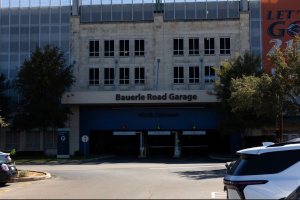UTSA faculty discuss Russian invasion of Ukraine; on-campus organization raises funds for Ukrainian Red Cross
April 19, 2022
The Russian invasion of Ukraine, which began on Feb. 24, 2022, has now entered its 8th week. The invasion has directly resulted in severe civilian casualties in Ukraine, and thousands have been displaced from their homes.
“There are many levels and many dimensions to explaining the war. Although there has not been a consistent or systematic explanation provided on behalf of Russia for this ‘war of choice’ that [it] is generally referred to in the media, the fundamental question is, of course, Russia’s displeasure at its declining position in the international system after the end of the Cold War and its claim on reviving its status as a superpower and revising also its position within the post-Soviet space,” Dr. Boyka Stefanova, professor of political science and global affairs at the department of political science and geography, said.
Dr. Stefanova is teaching a class that analyzes geopolitics in the context of Russia and explained that the class maintains a view on the “border issue,” which involves the Russian effort to “recapture what it [Russia] assumes are its territories of dominance and legacy,” from several perspectives while adding that the invasion was a “violation of basic international principles.”
“Russia’s war on Ukraine is, first of all, a tragedy for the Ukrainian people, so there is a humanistic and also the humanitarian aspect that has no excuse. No excuse also for the aggression — first of all, this is a flagrant abuse and violation of basic international principles,” Stefanova said.
While the course focuses more on geopolitics, Stefanova explained that the class has also looked at the media aspect of the war.
“We have certainly discussed the fake news campaign and the sources … I regard the media as one component of the crisis and of the war, and we have to focus on it. The bigger question for me is why this massive disinformation campaign is possible? … the bigger question is the configuration of public space in Russia,” Stefanova said. “How could we be students of global politics or international politics if we do not include that major development in the international system? This is a major shock to the system. It’s going to be a long-term one — so it’s not just a shock but a major, long-term repositioning of actors and of processes of cooperation internationally.”
Andrew Chapman, director of UTSA’s Russian Language Program, is also co-teaching a course that deals with reading and analyzing Russian media sources. Chapman explained that the war has become an important part of instruction.
“We didn’t anticipate when we planned the course for this war to happen, but we’ve used the course to closely study the war,” Chapman said.
Chapman also explained the common phenomenon of discrepancies in media reporting and bias, and how it relates to Russia.
“We’ll see lots of discrepancies in events and facts, but we’re also just very, very interested in learning about what are the trends and the narratives that Russia is trying to tell through its reporting of facts. Because sometimes they can report the same exact events and facts that the western media is reporting, but the attitude toward it, the story being told is going to be completely different — what they latch onto and what they choose to accentuate is very different than perhaps the story that would be told by US media,” Chapman added.
Chapman is also the faculty advisor for the Organization for Russian Studies at UTSA and touched on the efforts of the organization in providing students with accurate resources in the context of the war.
“In addition to the fundraising, we have an info pamphlet that the students created … which has sites that are very good to understand the war and sites from various trusted sources and they also have a list of ways you can help. So we want it to not just be fundraising, but also kind of awareness-raising. I think everyone has seen this in the news, but it’s a good way to kind of direct people to places where we think it would be good for you to get information,” Chapman said.
Rachel Pharr, president of the organization, further explained the organization’s fundraising efforts.
“We had a table out … and we raised a hundred and seven dollars. We donated all to [the] Ukrainian Red Cross. And while it’s not a lot of money, I would say every single penny counts,” Rachel Pharr, president of the organization, said. “The biggest thing with us going out and fundraising and talking to people was raising awareness about what’s going on and just spreading information.”
Pharr also expressed that the organization hopes to continue raising awareness about the war.
“We have been talking about what’s going on, and we’ve been keeping up with it leading up to the war and during the war — right now. We would like to do more outreach stuff. That was just our first time, and I know a lot of people in the club want to keep that up, so we’ll probably do more of that — hand out pamphlets and things like that,” Pharr said.
Pharr further emphasized the importance of having an understanding of the war, adding that there are individuals at UTSA that are impacted by the war.
“I know it’s really hard to pay attention to what’s going on and keep up … it’s just so hard to listen to and read … but it’s really important to be paying attention and to understand what’s going on, different narratives that are out there in the media,” Pharr said. “It can seem like we’re so far away from that, but there are people on campus — I know multiple people on campus — who have family and friends in Ukraine. I think a lot of people in our organization, too, have friends in Ukraine, because we obviously have pen pals and talk to people in Ukraine so it’s not as far away as it seems.”







